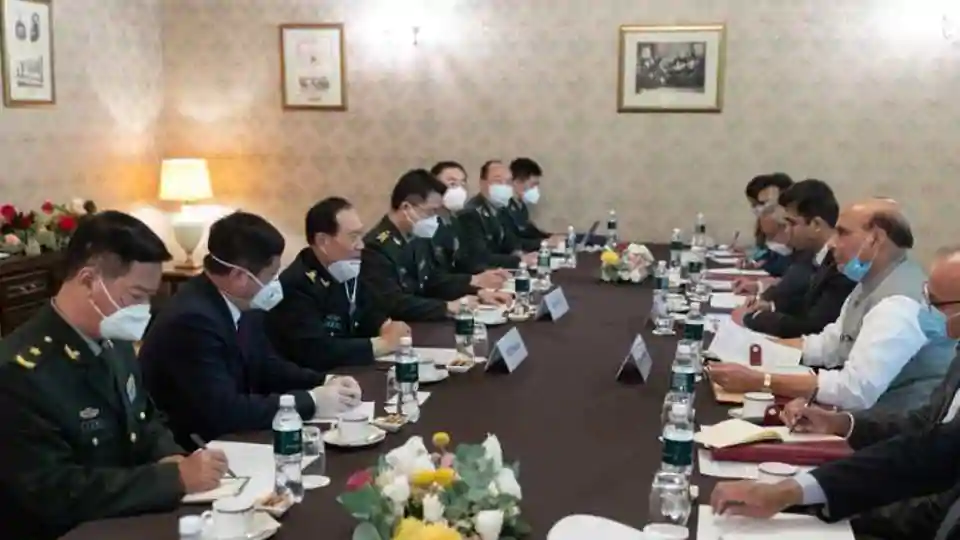
SOURCE: HT
The much-expected meeting between the Indian and Chinese defence ministers in Moscow amid the ongoing border tension remained inconclusive by all indications with Beijing again blaming New Delhi for continuing friction along the line of actual control (LAC) in eastern Ladakh.
A Press Trust of India report from Moscow said at the meeting on Friday, which lasted for more than two hours, the Indian delegation strongly objected to Chinese army’s fresh attempts to change the status quo in the southern bank of Pangong lake and insisted on resolution of the standoff through talks.
On Thursday, New Delhi squarely blamed Beijing for the tensions along the LAC over the past four months and said the only way forward was through negotiations – reflecting the impasse created by fresh attempts by Beijing to alter the status quo along the disputed border over the weekend.
The meeting between defence minister Rajnath Singh and his Chinese counterpart, Wei Fenghe, on the sidelines of the defence ministers’ meet at the Shanghai Cooperation Organisation (SCO) was the first high-level political face-to-face meeting between India and China since the border row erupted along the LAC in eastern Ladakh in early May.
External Affairs Minister S Jaishankar and National Security Advisor Ajit Doval have previously held separate telephonic talks with Chinese Foreign Minister Wang Yi to resolve the standoff.
According to China’s official news agency, Xinhua, Wei told Singh that the responsibility of the ongoing tension lies entirely with India – an allegation that New Delhi has brushed off repeatedly, saying that the border aggression has actually been shown by the troops of the People’s Liberation Army (PLA).
The same Xinhua report in Mandarin from Moscow quoted Singh as saying that India hoped that two sides will “…adopt a responsible attitude, fully disengage front-line forces as soon as possible, avoid taking measures that may escalate or complicate the situation, and avoid turning differences into disputes so as to bring bilateral military relations back to the right track as soon as possible.”
Wei said that recently the relations between the two countries and the two militaries have been seriously affected by the border issue, and that it was very important for the two defence ministers to have a face-to-face and candid exchange of views on relevant issues.
Wei added that the “cause and truth” of the current tension on the China-India border are very clear, and the responsibility lies entirely with the Indian side.
“Not an inch of China’s territory should be lost. The Chinese military has the resolve, capability and confidence to safeguard national sovereignty and territorial integrity,” the Chinese defence minister said.
The two sides should earnestly implement the important consensus reached by President Xi Jinping and Prime Minister Modi and stay committed to resolving the issue through dialogue and consultation, Wei said.
The Chinese defence minister said that Beijing hoped that the Indian side would strictly abide by the series of agreements reached by the two sides, effectively strengthen the control over front-line troops, and refrain from provocations across the current LAC.
India should not take any actions that may cause the situation to escalate, and not deliberately hype up or spread negative information, the Chinese said.
The two sides should bear in mind the overall interests of China-India relations and regional peace and stability, make joint efforts to meet each other halfway, cool down the current situation as soon as possible and safeguard peace and tranquility in the China-India border areas, Wei said at the meeting.
“The focus of the talks between the two defence ministers was on ways to resolve the prolonged border standoff,” an unnamed source told PTI.
Defence Secretary Ajay Kumar and Indian Ambassador to Russia D B Venkatesh Varma were part of the Indian delegation at the talks that began at around 9:30 pm IST at a prominent hotel in Moscow.
Several rounds of talks have been conducted through diplomatic and military channels to end the standoff that began in May.
The progress suffered a blow when Chinese troops resorted to what were described as “provocative military movements” on the south bank of Pangong Lake during August 29-30. They were thwarted by counter-measures by the Indian side, which quickly occupied several strategic heights and hilltops, and talks between local brigade commanders since Monday to ease the fresh tensions have been inconclusive.






